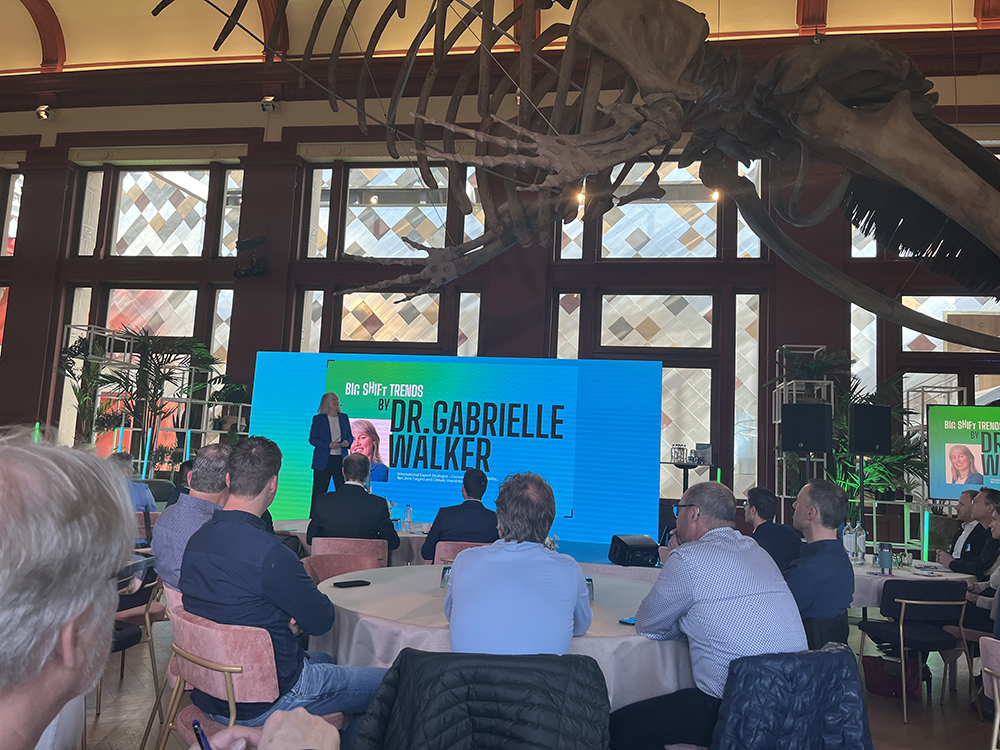
The construction industry is a highly conservative sector and has been slow to adopt many new technologies. But with greater understanding that climate change is a key issue facing humanity, the sector is now waking up to its need to adopt new processes and strategies. A conference on delivering sustainability to meet the need for climate change emissions reductions, has been held by compressor maker Atlas Copco in Antwerp, Belgium.
Convincing construction companies such as rental firms and contractors to make their operations more environmentally friendly is something of an uphill task. However, new legislation is emerging on the horizon in some countries that will make this a requirement for contracts to be awarded. For the construction sector, making the move to a green business model with a focus on fewer carbon emissions does not have to be a painful exercise, and it can even be a profitable move.
Kevin Schoeters, vice president communications at the Portable Air Division of Atlas Copco commented, “You can be sustainable and look after the growth of your business as well. Sustainability can drive innovation but by embracing sustainability, businesses can thrive.”
A key speaker at the Atlas Copco sustainability conference was environmental specialist Dr Gabrielle Walker. She commented that concern over climate change has become mainstream, instead of being the preserve of people perceived as tree huggers as it was previously. Dr Walker said, “You used to be on the side and that has changed. Climate change has become a central focus in business.”
The need to address global CO2 emissions is now recognised as being critical. Dr Walker said that according to Mark Carney, former head of the Bank of England, “Climate changes presents a significant risk for the global financial sector.”
The effects of climate change are enormous and have already resulted in increasing average temperatures, disappearing glaciers, forest fires and more intense storms as well as extensive flooding. Dr Walker said that the floods seen in Pakistan during 2022 were massive. “Pakistan is not a small country. Last year 1/3rd of the entire country was flooded.”
She added, “Storms are not getting more frequent but they are getting more intense.”
Flooding and fires will also cause increased pressure on flood supplies, with massive effects on the more vulnerable areas of the world. Factors such as the civil war in Syria or the Russian invasion of Ukraine have triggered major shifts in migration patterns (there are around 1 million Ukrainians in Germany alone, and more in Poland too for example). Dr Walker commented, “Migration is happening now but will accelerate if climate change continues.”
Investing in fossil fuels however represents a dead end according to Dr Walker. These stranded assets will become financially negative in a comparatively short period and will become a poor long-term investment. Dr Walker quoted a comment from Larry Fink, CEO of Blackrock, “Climate change has become a defining factor in companies’ long-term target.”
She pointed out the crucial need for change and said, “Carbon emissions have to reduced by 45% from 2010 levels. By 2030 we need to be removing about 20 billion tonnes/year of CO2”
Dr Walker also said that the COVID-19 epidemic has changed the way many people think and commented, “The pandemic sped up action on climate change.”
However, electrification does not have to mean adopting worse technologies and she said for example that motor vehicles such as the Tesla range show EVs can offer high performance With nearly 40% of cars on the road in Norway’s capital Oslo now being electric models, this highlights how such vehicles are already supplanting internal combustion engine versions. And she also said how aiming for reduced emissions can be highly profitable. Using data to improve efficiency will reduce waste for construction, while improving profitability and addressing climate change with CO2 reductions. Although the hotel sector is very different from construction, moves in the sector show how firms can improve the bottom line while ensuring they improve their environmental profile. For example, Dr Walker said that Hilton Hotels set out a plan to reduce CO2 emissions, achieving a reduction of 30% and also cut waste by 50%. This brought cost savings of $1 billion.
Green technologies are already providing benefits according to Dr Walker. A new CO2 removal plant in Texas is now removing 500,000tonnes/year of CO2 and this will increase to 1 million tonnes/year. The CO2 is then sequestered in spent oil wells. Her figures show that steel production is responsible for 8% of global CO2 emissions, but she commented that many major car firms are aiming for all cars to be made from fossil free steel by 2030.
The cement industry accounts for 7% of global CO2 emissions but major cement producers such as CEMEX, Heidelberg Cement and LafargeHolcim are already introducing low carbon cement processes and are even working on carbon sequestration technologies. Using precast components for many civils works can make a substantial reduction in cost. Precast components made at specialist facilities use less concrete and steel and are lighter, making them easier to transport. Using low carbon concrete materials now coming to market can deliver benefits also, although low CO2 concrete often features longer curing times.
Construction firms have also noted the benefits for the bottom line of adopting green policies. One such is US construction machine rental firm Equipment Share. Jabbok Schlocks, CEO of Equipment Share commented, “Mckinsey says we lose about $1 trillion due to inefficiencies in construction.”
He said that effective data recovery is a key to efficiency, “The next step is to make sure all machines are connected.”
Schlocks said that the construction industry remains highly inefficient. Firms focus on getting the job done, but often at tremendous cost with regard to having surplus equipment onsite for example. He commented that a large jobsite might have 1,000 machines onsite. However, with greater efficiency employed, just 300 machines might be able to do the job.

Construction machinery makers are already seeing the need for reducing emissions, with a series of major firms such as Caterpillar, Hyundai, JCB, Komatsu, Liebherr and Volvo CE all having made major advances in low emissions technologies for the future. Bert Derom, president of the Portable Air Division at Atlas Copco said, “Industry is changing faster and faster. Sustainability is good for industry.”
Electrification does offer benefits and Derom said, “The electric motor is so much more efficient than the diesel engine.” He said that even if the power generated is not green, using electric machines delivers savings and added, “We have a responsibility to drive this transition.”
Switching to electric equipment could offer other advantages also and Derom said, “One advantage of an electric compressor over a diesel machine is that it lasts longer and needs less maintenance.”
Saïd el Khadraoui is European Green Deal Advisor and European Green Deal Insitiutional Expert and said, “We need to act now or we will reach a tipping point and change will become irreversible. It’s happening now.”
Southern Spain has seen record high temperatures of 40°C in May, which has never been seen before. El Khadraoui said, “This will trigger extreme weather events more often.”
Extremes of weather will affect water supplies which will hit food production, increasing migration from the worst affected areas in the developing worlds and also potentially triggering wars. Physical assets can be at risk from climate change. In Germany low water levels in the River Rhine have hit water traffic and impacted on transportation costs.
He commented, “There are many opportunities if we manage this process well. We need a faster way of introducing the changes in the technical regulations.”
Although he said that there will still be some emissions by 2050, these will be offset by emissions reduction from other areas.
Edith Guedella is head of sustainability at the Spanish construction firm Acciona, a company that adopted more environmentally friendly policies some years ago. Using recycled materials in construction has helped lower waste, improve the bottom line and delivered necessary cuts in CO2 emissions. She said , “The minimum requirement for recycled aggregate is 20% but we need to increase that by 10%.”
She continued, “More sustainable machines use less energy. There are possibilities for machines of less than 15tonnes running on electricity.”
However, she said that for larger machines, the use of electric power remains less feasible around the world. “That is why we are aiming for this transitional process.”
In addition, recharging facilities do have to improve for EVs and electric machines to become more prevalent. This is a key challenge that remains to be met. Delivering a greener profile can be achieved by industries such as construction and can improve cost-effectiveness at the same time. But Dr Walker commented, “You’ve got to reduce your emissions and you’ve got to have a plan.”









